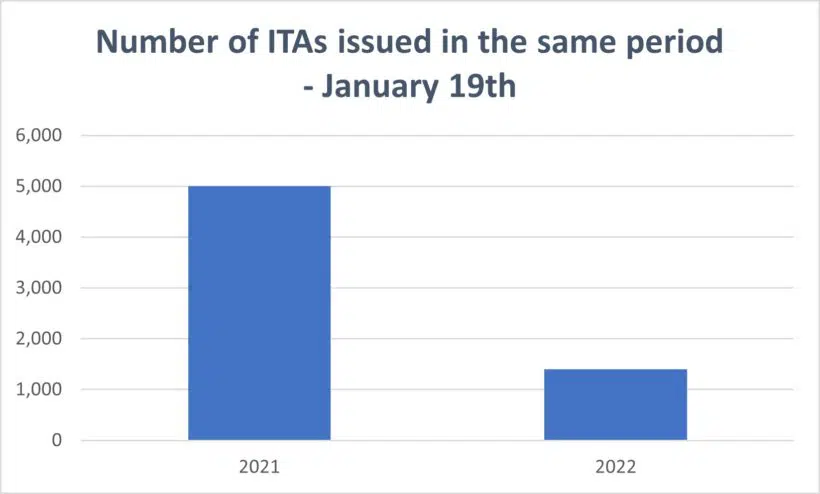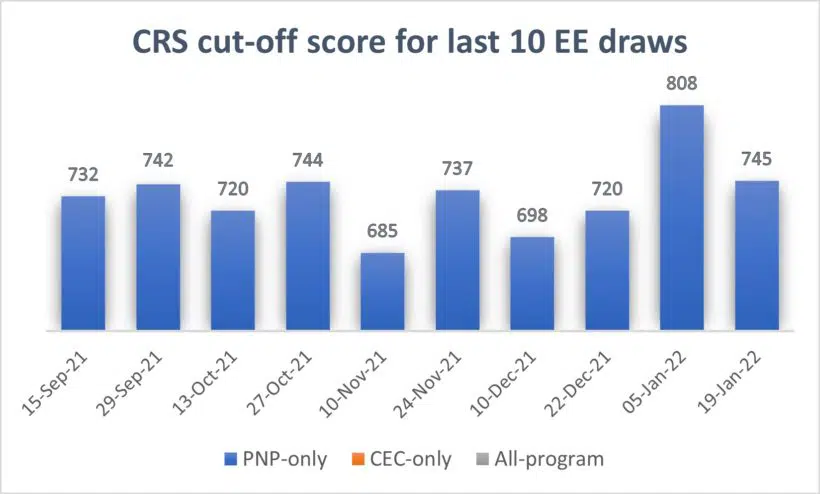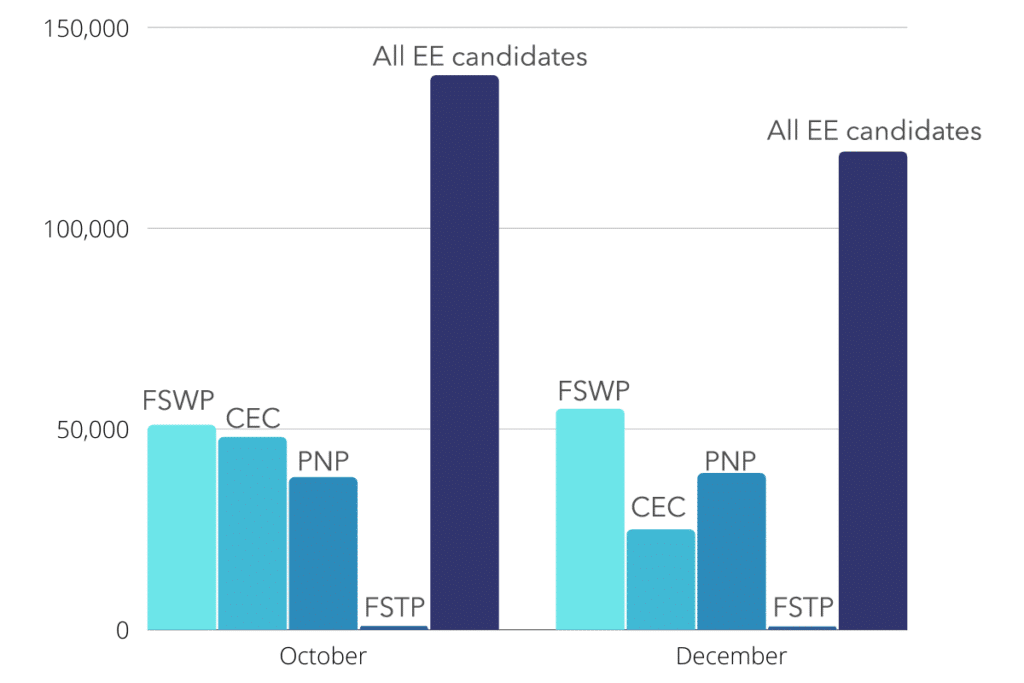In the first two draws of the year, IRCC has only invited PNP candidates to apply for Canadian immigration.
Source: CIC News
Canada held a new Express Entry draw on January 19, inviting 1,036 immigration candidates to apply for permanent residence.
Immigration, Refugees and Citizenship Canada (IRCC) only invited Provincial Nominee Program (PNP) candidates. For this reason, the Comprehensive Ranking System (CRS) score cutoff was 745. PNP candidates get an automatic 600 points added to their score when they receive their nomination, which is why the score seems high.
All Express Entry draws since September have been for PNP candidates only. The last time Canadian Experience Class (CEC) candidates were invited was September 14.
So far in 2022, IRCC has invited 1,428 PNP candidates in total under Express Entry. Generally speaking, the CRS cut-off has been in the 700-800 range during the last 10 PNP-specific EE draws. Today’s cut-off of 745 was lower than the 808 CRS requirement for the first draw of this year on January 5.


FSWP and CEC candidates make up almost entire Express Entry pool
As of January 4, there are about 194,000 Express Entry candidates in the pool. About 80% of these candidates are eligible for the Federal Skilled Worker Program (FSWP), and nearly 20% are eligible for the CEC. These numbers are rounded, but the difference makes up the number of candidates eligible for other programs like the PNP and the Federal Skilled Trades Program.
IRCC has not invited FSWP candidates to apply for permanent residence since December 2020. Before the pandemic, FSWP candidates were by far the most commonly invited. About 45% of all Express Entry invitations went to FSWP candidates in 2019. But since FSWP candidates have not had the chance to apply for more than a year, the pool has filled up.
The number of CEC candidates in the pool has also dramatically increased since September. Currently, they make up nearly 20% of the pool, whereas six months before they made up about 6%. That was in June when IRCC was holding large CEC draws inviting 6,000 candidates to apply at a time.
An internal memo from September suggests that IRCC paused CEC draws to help reduce application backlogs and get Express Entry processing back down to six months. In 2020, the average processing time for Express Entry candidates was up to nine months.
Although IRCC managed to ramp up processing to more than 45,000 applications per month toward the end of the year, the backlog in immigration applications also climbed by 21,000 applications between October and December. In that time, the Express Entry backlog went down from a backlog of 138,000 to 119,000. Most of the progress was driven by a reduction in CEC application backlogs, which went down from about 48,000 in October to 25,000 in December. The Federal Skilled Trades Program (FSTP) backlog also went down from 931 in October to 805 in December.
The Federal Skilled Worker Program (FSWP) backlog increased by about 4,000 applications between October and December, from about 51,000 to about 55,000. The Provincial Nominee Program (PNP) backlog also increased by about 1,000 applications to 39,000 in December.
Express Entry application backlog

What is Express Entry?
Express Entry is the application management system for three Canadian immigration programs: the Canadian Experience Class, the Federal Skilled Worker Program, and the Federal Skilled Trades Program. PNP candidates in the Express Entry pool have already qualified for one of these programs.
Express Entry uses a points-based system, the Comprehensive Ranking System (CRS), to rank candidates’ profiles. The top-scoring candidates receive an Invitation to Apply (ITA), and can then apply for permanent residency.
Next, an IRCC officer reviews their application and makes a decision. After that, IRCC will ask for biometrics and may set up an interview or request more documents.
If the application is approved, IRCC issues a Confirmation of Permanent Residence (COPR). Approved permanent residents can then complete the landing process. If they are outside Canada, they can access pre-arrival services to help them with the first steps for settling in Canada.
Who was invited?
The following is a hypothetical example of someone who may have received an ITA in the new Express Entry draw.
Saylor is 34 years old, holds a bachelor’s degree, and has been working as a social services worker for six years. They wrote the IELTS and scored a 7.5 in listening and a 6.5 in every other ability. Saylor has never worked or studied in Canada. They entered the Express Entry pool with a CRS score of 333. Saylor was then invited to apply for a provincial nomination, and their application was successful. With the provincial nomination, Saylor’s CRS score increased to 933, which was high enough to receive an ITA during the new Express Entry draw.


 info@clickimmigration.com
info@clickimmigration.com